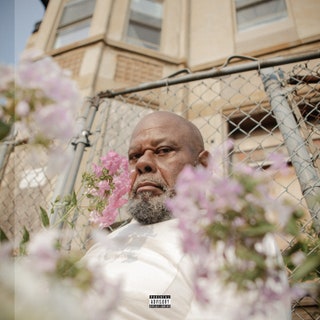
Saba, Few Good Things | Noah Weinberg
Early in his latest album, Few Good Things, Saba reminds the audience of his horrendous past, rapping, “my cousin still supposed to be h-.” He deliberately cuts himself off, not wanting to rehash the themes of previous albums. Following the tragic death of cousin John Walt, Saba poured his grief onto his 2018 album, Care For Me. Met with widespread critical acclaim for its grim introspection, Care For Me catapulted Saba into a different stratosphere of hip-hop fame. Saba returns with Few Good Things, an ode to life’s beauty undercut by his newfound chrometophobia (the fear of losing money), or, as Saba puts it, “the baggage that comes with the bag.” Centered around a cliched attitude of gratitude that’s reflected in the album’s title, Few Good Things ultimately falls short of the Chicago rapper’s previous work.
There are some pleasures to be found. Few Good Things‘ grandiose production is a substantial upgrade from Care For Me’s minimalistic sonic landscape. The lead single, “Fearmonger,” innocently bops around like kindergartener hopscotching during a rainy recess, underpinned by a sample taken from Chance the Rapper’s “Eternal.” However, the song’s euphoric production belies its dark lyrics. Over the synthesizer-lead beat, Saba raps, “And scared money never made money, what I was taught/ But once you made money, you more afraid than us all.” This dichotomy between dark lyrics and upbeat music makes for a wholly substantive track.
Few Good Things has many shortcomings, though. “A Simpler Time” is the most unlistenable piece of music of 2022. Between the bird chirps, deranged guitar chords, and a 119 BPM metronome ticking in the background, this song sounds like a middle schooler button-smashing his way through a GarageBand tutorial.
While Care For Me told a distinctive and personal tale of navigating grief, Few Good Things could belong in a dozen rappers’ catalogs. Saba’s had a rough upbringing, coming from “a poverty-stricken parable that our hearts had written… from fifty-cent bags of candy and penny pinchin’.” His tough upbringing doesn’t stop Saba from appreciating his triumphant origin story. On the chorus of the penultimate song, “2012,” Saba achieves peace by ambiently serenading, “I had everything I needed, everything.” This emotional arc of self-reflection ultimately leaves the listener yearning for more–we’ve heard it all before.
While the sentiment of “money doesn’t buy happiness” remains raw and real, it has become a cliché in hip-hop. Biggie’s “Mo Money Mo Problems” turns 25 this July. Unlike Saba, J. Cole didn’t need an entire album to determine on “Love Yourz” “there’s beauty in the struggle, ugliness in the success.” Saba should have found another angle on this hackneyed trope.
Few Good Things works best when Saba taps into original stories coupled with rich production. His writing has drastically elevated in quality, and that’s evident in this album’s vividly detailed imagery. Few Good Things’ instrumentation sounds polished and expansive, and while Saba’s appreciative attitude is heart-warming, Few Good Things is ultimately more forgettable than his previous projects.
